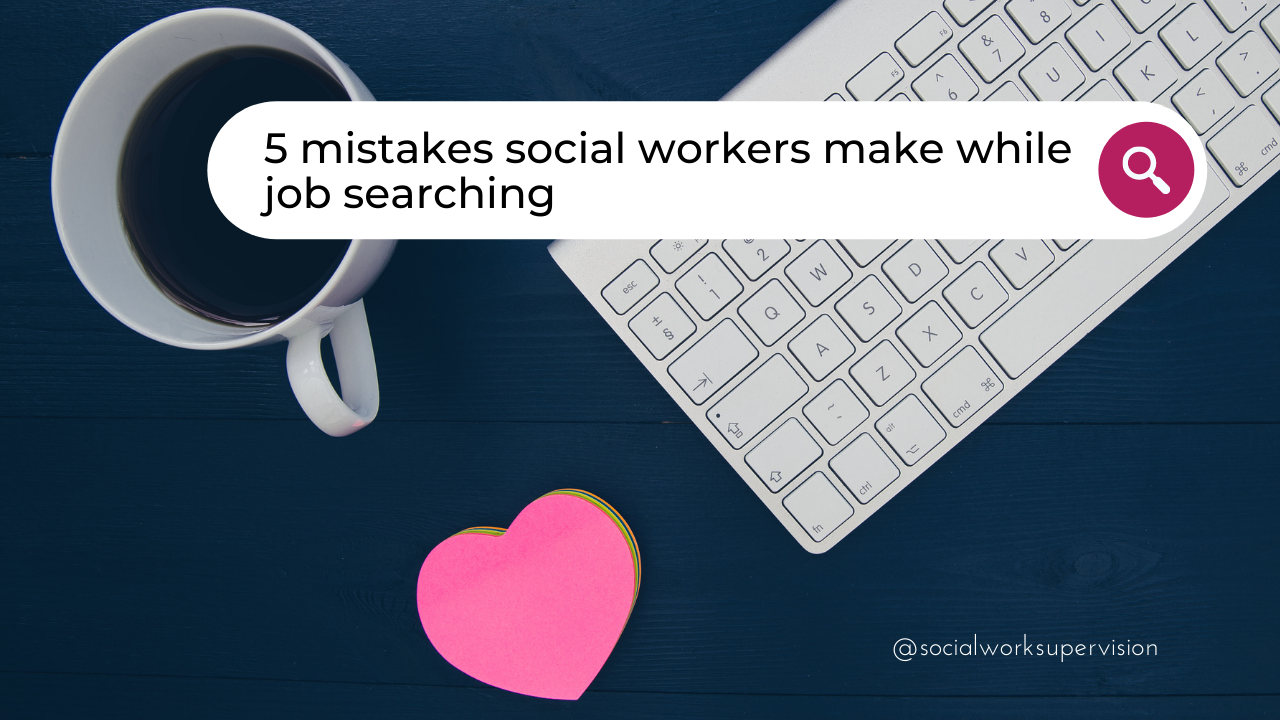Top 5 Mistakes Social Workers Make in their Job Search

Social workers are pretty notorious for staying in jobs too long and underselling themselves, don't you think?
It isn't all our fault. Afterall, we're told from day one of social work school that "we're not in it for the income, we're in it for the outcome." I even had a job where the expectation was to "do whatever it takes" to get results with our clients. This led to some frightening situations that put my colleagues and me at risk.
Let's not forget that we learn NOTHING in our social work programs about salary negotiation, selling ourselves in an interview and pursuing promotions.
We're funneled out of our programs into low-paying jobs with high acuity clients and risky workplaces. And we're told we MUST appreciate our "time in the trenches."
UGH.
Part of my supervision style is to throw these old-school ideas about what social workers "should" do and replace them with new practices and skills.
Until we demand more, things won't change.
So let's start changing our expectations now.
Repeat after me: I deserve a good job and a livable (or more) salary and excellent support from my organization, supervisor and team.
Repeat often.
Good. Now let's talk about the mistakes we make that keep us trapped in social work jobs that don't serve us.
1) Social workers stay in jobs for way too long because they are afraid or ashamed to leave.
Here's how this goes. You know you need to go, but you can't shake feelings of fear, guilt and shame. Then things get so bad that you need to leave ASAP. What happens next? Your job search becomes a frantic scramble to get out, rather than being a thoughtful and purposeful path to your next career step.
Moral of the story: Start applying for jobs now and leave that job on YOUR terms.
2) Social workers get stuck on details in the job description.
The top two barriers here are expectations about having specific skills or a certain number of years experience. Say a job listing says they want 3 years of experience and you only have one. Ask yourself: is your experience applicable? Yes? Then apply anyway. Benefits are practicing your interviewing skills, making network connections and just maybe find a workplace willing to train you because YOU are the best candidate for them overall. You won't get them all, but it is worth trying.
Moral of the story: Apply for jobs you want, even if you're not a perfect match.
3) Social workers decide that shifting to a new part of the field is impossible.
Are you hoping to switch from school social work to providing therapy? Want to do medical social work but you're currently doing casework? i think you should go for it. First, take a look at your transferable skills and lean on your foundational social work skills. Like above, you might just find a job where they are willing to train because they want YOU to work for them. Do your due diligence, though. Read relevant books, attend a training, volunteer or do PRN (as needed) work in adjacent fields until you're ready to make the jump!
Moral of the story: Remember that our core social work skills are highly transferrable.
4) Social workers don't always prepare for their interview.
We're natural communicators and depend on our skills of flexibility and adaptability (sometimes known as flying by the seat of our pants). Problem is, job interviews are NOT times to just hope for the best. A bad interview can keep a great candidate out of a great job. Know what you want to say and practice in the mirror and with a peer. Research the organization and your potential position so you can roll right along with the interviewer's questions. Prepare a few questions of your own. THEN, see the next mistake:
5) Social workers are afraid to ask questions and get the answers they need to make a good decision.
Have you ever been in an interview and found yourself blanking out when the interviewer asks about your questions? Been there. This is why preparation is so important. Write down your questions and take them with you. There's no shame in bringing along a helpful resource for your self. Most important questions: Ask about salary, PTO and other benefits. Inquire about workplace culture. Ask about supervision style and availability and training allowances. Be prepared to read between the lines. Every interviewer wants to highlight the best parts of their organization. Please, don't wait until you've been hired to start asking these questions.
Moral of the story: Ask about every little thing you need to know about a job BEFORE you accept an offer.
One last thought. Don't feel like you MUST stay in a job for at least a year. If a job isn't serving you or your job is harming you, GO. More on this in future posts.
Okay, you wonderful social worker you. Its time for you to update your resume and see what other opportunities are waiting for you!
Drop me a line about these mistakes or others I didn't mention!
Happy job hunting!
Want more job tips and tricks? Sign up for my monthly newsletter here.

